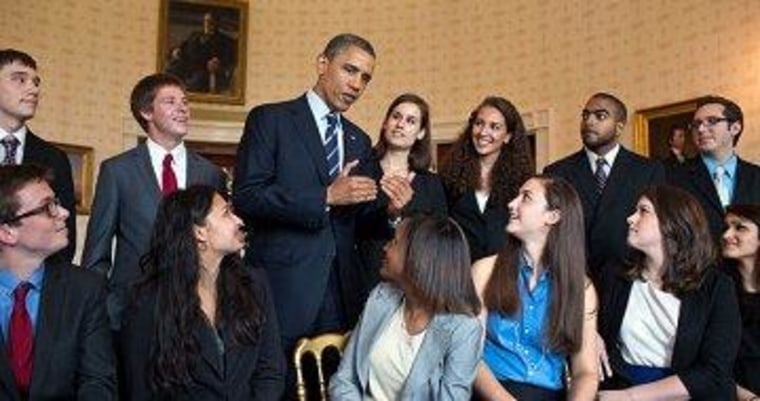In about an hour, President Obama will deliver remarks, flanked by college students, on a subject that too often goes overlooked: student loans. With a looming interest rate hike, the president will reportedly "call on Congress to help keep college affordable for middle-class families and students by preventing student loan interest rates from doubling on July 1."
Indeed, with just a month to go before the rate hike, Sahil Kapur reports that this issue is poised to reclaim center stage, just as it did at this point last summer.
A battle is heating up between President Obama and Republicans on how to prevent student loan interest rates from doubling to 6.8 percent in July -- a flashpoint in the ongoing efforts of both parties to win young voters, who strongly favor Democrats. [...]Speaker John Boehner's (R-OH) office lashed out at the White House Wednesday after the event was announced. Labeling it "stunning student loan cynicism," Boehner spokesman Brendan Buck noted that unlike the Democratic-led Senate, the Republican-led House has already passed legislation to prevent student loan interest rates from spiking on July 1."It's obvious that the White House would love nothing more than to change the subject from its growing list of scandals, but scheduling this PR stunt reeks of desperation," Buck wrote on the Speaker's blog, noting the similarities in the two loan proposals. "Picking a fight out of thin air where there's policy agreement isn't going to get the White House out of trouble, and it certainly doesn't do anything to help students facing a looming rate hike."
First, there is no list of White House scandals -- the total is still zero. Second, the deadline matters to millions of families, so there's no point in dismissing it as some kind of partisan distraction. And third, there isn't policy agreement on student loan interest rates, as even the Speaker's office should understand.
Let's back up and provide some context here. As we discussed several weeks ago, Congress passed a law in 2007 that kept the interest rate for federal Direct Stafford Loans at 3.4%. Last year, that law was set to expire, and without congressional action, the rate would have doubled, affecting more than 7.4 million students, who would have faced, on average, an additional $1,000 in debt.
Policymakers eventually reached a deal and the lower rate was locked in, but it was temporary -- on July 1 of this year, the rates are set to double again.
House Republicans say they've already passed a bill on this, which is true. They also say their bill is worthwhile and consistent with White House demands, which is not true.
Obama's approach and the GOP's bill do have one thing in common: they tie student-loan interest rates to the yield on 10-year Treasury bills. But the White House's proposal includes all kinds of safeguards to make things easier on young people, including fixing the rate to whatever it is when the loan is first taken out (so students wouldn't suddenly see a spike when T-bill yields change) and shielding borrowers from having to make more than 10% of their income.
House Republicans are comfortable with the Treasury bill condition, but ignored the White House's proposed safeguards. Why does this matter? Because while the yield on 10-year Treasury bills is currently very favorable, this won't last forever, and Obama sees the safeguards as providing a cushion for young people going forward.
Meanwhile, Senate Democrats are slowly coalescing around a plan from Sen. Elizabeth Warren (D-Mass.), which would tie student loan rates to the rate big banks get through the Federal Reserve discount window. Republicans are, not surprisingly, hostile to the idea, but as of last week, Warren's bill had eight cosponsors.
